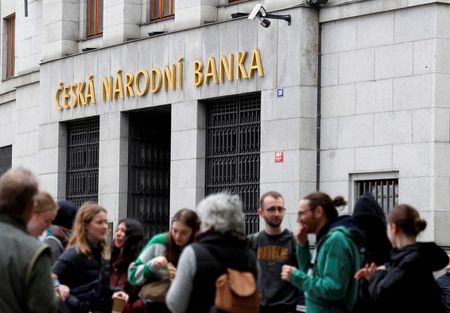 1
1 1
1
By Jan Lopatka
PRAGUE (Reuters) -The Czech central bank will begin debating lowering interest rates as soon as this autumn as it expects inflation to drop sharply particularly at the beginning of next year, Vice-Governor Jan Frait said on Tuesday.
With inflation on a downward path across central Europe, markets are betting on who may follow Hungary in easing monetary policy.
The Czech central bank has, however, been fighting against expectations of a quick drop in rates, and debated a rate hike at the last few meetings to ensure inflation remained on a downward trend.
Frait told Reuters in an interview on Tuesday that the latest data took chances of further hikes off the agenda for him and the question was when the bank would start loosening after keeping the repo rate at 7.00% since June 2022.
“We are very sure that inflation will drop in a relatively short horizon to really low single-digit levels,” he said. “It is clear from (the outlook) that interest rates, ours and in the market, will follow this development.”
“I would wait for what major central banks do, but the debate is getting closer and it is without doubt we will get to it in the autumn,” he said, adding he could not specify though whether that discussion would be at the bank’s late September meeting or in November.
Frait was close to voting to raise rates in May and said at the bank’s June meeting that more hikes by major central banks may be a factor for a Czech increase.
On Tuesday he said any such hikes by others would have to be significant to prompt the Czech bank to follow suit, a scenario he added was extremely unlikely.
He expected the drop in inflation to be “very strong” at the start of 2024, when the central bank’s forecast sees price growth falling near its 2% target, from 9.7% in June.
CHANGE IN MESSAGE
Frait said the bank may change its messaging at the Aug. 3 policy meeting to remove in the board statement a reference to the possibility of a rate hike ahead.
“The sentence does not have to be there, or we can get into a symmetrical state when the development in the short term will not be skewed in either direction.”
Still, he cautioned against rushed rate cuts, noting risks especially from the tight labour market and potential un-anchoring of inflation expectations.
He said rates would probably drop slower than the money market was pricing in, which is about 100 basis points by the end of this year.
Frait reiterated his view that rates would be higher going forward than in past years of ultra-loose policies.
He also said the crown, which has lost 3.3% versus the euro since a 15-year high in April, was resilient to narrowing interest rate differentials.
(Reporting by Jan Lopatka, editing by Jason Hovet and Emelia Sithole-Matarise)